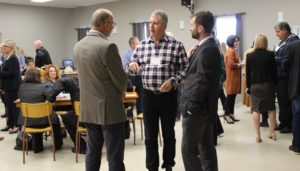Planning for Success

Brenda LaGrandeur moderates panel with Warner Comeau, Katie Goodwin, and David Arenburg
Katie Goodwin was an engineer in Alberta and bought a business in Barrington so she could move back home. David Arenburg moved to the region to buy a franchise, which he then grew and sold 30 years later. Warner Comeau built a business in partnership and planned for the day when he would sell his share. Very different circumstances and business deals yet all have followed the same basic steps of business transition.
At the Western REN’s 6th Annual Summit last week, the subject was they ways and means business transitions when ownership changes. Western REN CEO, Angélique LeBlanc explains why this topic was selected. “On a Canada-wide level, studies show that almost ¾ of small businesses have no ‘succession’ or business transition plan. In our region, there will be many owners looking to exit their businesses in the next 10 years and without planning, many of those businesses will simply be shuttered. That could have a large negative impact on the regional economy and would be a terrible waste of resources.”

Angie Greene moderates panel with Robert Patzelt, Harold Duffett, Paul Ryan, and Brad Langille
The first panel provided stories of first-hand experiences and set the tone by naming the three “M”s of business transition: Money, Mechanism, and Mindset. After a break, a second panel of professional experts offered insights and advice on how to prepare your business for an easier and more profitable sale. Both panels agreed that the financing (Money) and legal steps required (Mechanism) are the easiest part of the process – and that professional advice early in the process is both a valuable investment and worth the cost. Panelist also all agreed that the hardest part of the process is the right Mindset.
Preparing to sell, or buy, a business requires an honest evaluation of your own knowledge, goals, and motivations. Sellers need to ask if they see themselves walking away from the company or changing their role in it. Buyers need to consider what professional services they will need and whether this business is a good fit for their lifestyle and interests. Insights included ways of balancing privacy with transparency, understanding the difference between leadership and ownership, and recognizing the need to invest in the company right up til closing the sale.

Western REN Summits always include breaks and meals for networking
These, and many other insights were life-streamed and are available for viewing on the Western REN Facebook page and YouTube channel. Following the panel discussions, a keynote presentation used fisheries as a case study for how individual businesses can impact an entire sector, underscoring the regional importance of good planning for business transitions.
Panelists:
- Panel 1: Warner Comeau, Katie Goodwin, David Arenburg
- Panel 2: Robert Patzelt, Harold Duffett, Paul Ryan, Brad Langille
- Keynote: Zach Whynot




